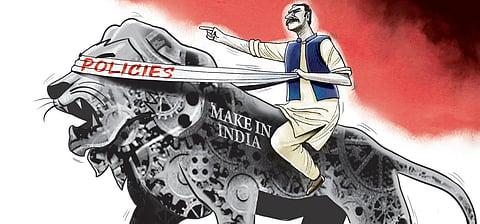

NEW DELHI: Indian policymakers are realising that their twin objectives of building high customs duty walls to stimulate a 'Make in India' program, and carve out trade pacts with their largest trading partners such as the European Union and the US are often at variance.
Top officials said the work that went into the Indo-EU summit held earlier this week was "an example of this... They (EU) want tariff cuts and market access in return for trade concessions that we are looking for... but giving anything away at this moment when Indian industry is in recession and we are promoting Make in India, is well nigh impossible.”
Possibly realising this, European Commisson President Ursula Von der Leyen announced at the end of the summit that the two sides will be working towards a free-trade agreement, though there is "still a long way to go." Von der Leyen pointed out that any deal "needs to include our usual requirements in terms of market access, public procurement and, of course, sustainable development."
A key element in India's 'Make in India' initiative is to build tariff walls to deter competing imports of certain products such as automobiles and electronics and to give home-grown businesses a free ride in the domestic market.
ALSO READ | As urban business lags, rural India drives recovery from COVID-19 fallout
Duties ranging from 15 to as high as 200-300 per cent are used as deterrents to competition, something that India’s trading partners are not happy about. However, analysts and Indian policymakers, point out that that the EU and US too have high duties and other hidden protection.
"High levels of subsidies such as in farming make it impossible for our farmers to compete against them without duty protection," pointed out prof Biswajit Dhar of JNU, a member of the Board of Trade.
However, industries such as textiles and software which are anxious to reverse declining fortunes by improving market access to major markets such as the EU, US and Japan want trade deals to come through. Commerce Ministry officials said they were being lobbied in favour of a quick trade pact with the EU by domestic textile manufacturers.
"The garments, textiles associations are in favour (of trade pacts)," said a top official.
India wants to start negotiating free-trade pacts with both Britain and the European Union now that their divorce has come through besides working out a preliminary trade pact with the US.
Top officials said they had been told to restart the off again and on again trade negotiations with EU, which started in 2007. And also to formally start trade talks with Britain now that it was no longer bound by EU trade rules.
Said Dhar, "To negotiate these pacts, we need to be clear what we will get and what we will be giving away. The balance needs to be there. Striking that balance will be difficult given the troubled times where our industry is going through a recession and. Our farmers need protection."
The problem in not doing anything is that foreign trade contributes about 43 per cent of India’s GDP and exports have witnessed a massive fall of 36.71 per cent in the April-June 2020 period. A continued free fall would hit India’s overall income levels besides hurting several key sectors.